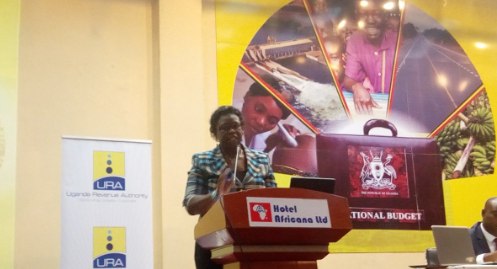After facing criticism from taxpayers, the Uganda Revenue Authority (URA) has moved to synchronise the much-dreaded income tax with the property tax, a move that could lead landlords to reducing on the burden on tenants through rent.
Uganda Revenue Authority has since 2014 been collecting tax on all rental houses and properties within urban areas as part of its new initiatives to generate more tax revenue to implement government programmes.
Doris Akol, the commissioner general at the URA said during the 2017 Budget Breakfast on May 12 that the multiplicity of local government and central government taxation was an issue the authority had planned to review in this financial year.
“The fact that you, as tax payers have asked about the multiplicity of taxes being synchronised, yes it is a policy issue and conversations are ongoing to see how we (government) can combine the taxes so that the tax burden is reduced,” Ms. Akol said at Hotel Africana Kampala where manufacturers, business people, media, policy makers and URA staff gathered and had an interactive discussion to listen to the details, tax policies and tax laws that URA is set to implement in this new Financial Year.
Ms. Akol’s explanation came in response to a question about URA and KCCA workers/law enforcement officers harassing taxpayers in Kampala during their exercises but an official at URA headquarters in Nakawa told TheUgandan that the talks where still at high-level and nothing was conclusive as plans for the two being combined are still being developed.
“Please give us the time to get the specifics together,” said Solomon Kimbugwe, a Media Management Officer at URA.
URA taxes income tax per shop. The smallest shop in the Kampala Central Division, which is the central business district of the country pays Shs600,000 in income tax.
Rent for a shop in Kampala City is above Shs1m in addition to power bills. A shop owner must also pay trading license, which ranges from Shs175,000 to Shs1.5m, to KCCA who have this financial year increased the amount of money by three times what it charges in property tax.
A landlord, who was paying Shs15m property tax for a building, is now paying Shs45m from June 1, 2017.
Property tax is paid annually on six per cent of the rateable value of the property.
Thirty per cent of Ugandans are rated as property tax compliant but these two taxes have been protested by traders and residents of urban centres since they are always passed over to them by their landlords in form of increased rent charges. “We are encouraging compliance for rental income. This is one of the areas that is most evaded,” Akol said.
Hiked rental charges have previously seen traders and landlords clash, with a trader shot dead at Arua Park as traders protested in April.
City traders and landlords have been bickering over the dollarisation of rent; something the former claimed has pushed many traders out of the city because they can’t afford the high dollar fees. Currently, a dollar goes for Shs3,626.
“We believe that we shall in time the dollarisation of rent especially in Kampala. That issue can be harmonised,” URA’s Kanyasige said.
What’s Changed?
A tax holiday for all SACCOs for 10 years up to 2027#KnowYourBudget17 pic.twitter.com/JBbEwBZNM7
— UgandaRevenueAuthori (@URAuganda) June 12, 2017
Akol however, said that they are continuing with sensitisation programs for taxpayers. “URA continues to host tax hubs so that whoever needs advice or is complaining about an issue is quickly and easily advised. Take for example while registering for and getting your Tax Identification Numbers, our staff can help.”
“We are optimistic that the targets will be achieved,” Akol added.
Even Matia Kasaija, the minister of finance planning and economic development bought into the idea of taxing more businesses to drive Uganda forward.
He told the audience at Hotel Africana that for as longer as a business is making money, it has to be taxed.
“If I don’t tax them, where will I get the money to build hospitals, roads for them,” Kasaija said. “Unless and until the economy moves, we are talking hot air and agriculture must be the base on which I industrialise Uganda and then tax them when they get rich.”
“To explain the policies is the job of URA. If they don’t do it, I will have an issue with the department,” Kasaija revealed.
Kasaija last Thursday read out a Shs29 trillion 2017/18 national budget for Uganda. The new budget will see expenditures for the next financial increase by Shs 3 trillion from the Shs 26 trillion allocated in 2016/2017.
Domestic revenue collections are projected at Shs 16.6 trillion in the financial year 2017/2018. The projected revenue is equivalent to 15.2% of GDP against 14.42% of GDP in the financial year 2016/2017.
Uganda Revenue Authority have been allocated additional Shs 90bn to enforce tax compliance.
Author: stephenmuneza@gmail.com, +256772544870 or Twitter @stephenkmuneza











